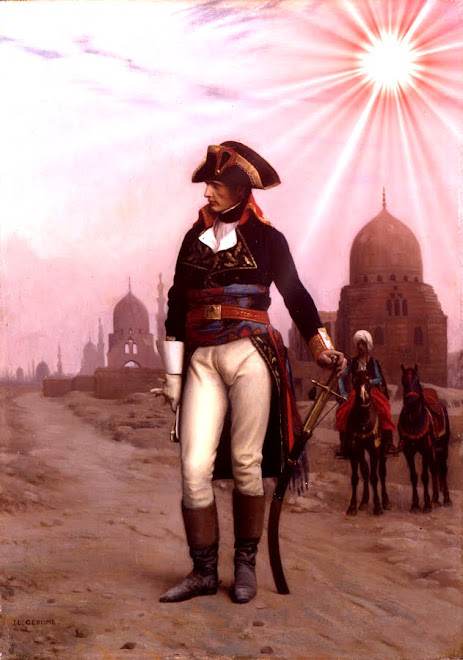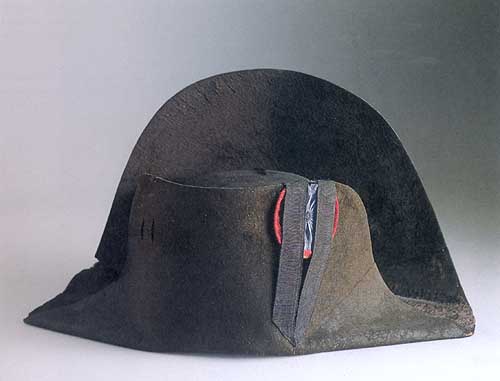It will soon be 200 years since Napoleon's infamous retreat from Moscow in the exceptionally cold winter of 1812-1813. It is also nearly 200 years since the Battle of Waterloo. Both of these events are part of our collective European memory, the one being seen as a human disaster and the other a 'triumph' of the
Allies against a
tyrant otherwise known as the Corsican Ogre.
Let us take a look at these events in the round and not just through the splenetic eyes of the English Establishment and their sirens such as Sir Walter Scott who have created two centuries of fishy tales about the man who set the alarm bells ringing for those devotees of Privilege.
In 1819, when Napoleon was languishing on the rock of Saint Helena with only two more years to live, mounted English militia charged into a peaceful crowd at Saint Peter's Field in Manchester and killed at least eleven English subjects in cold blood and wounded dozens more. This was obviously nothing to do with 'Boney' and everything to do with the rich elite stopping at nothing to maintain their brutal grip on power. No longer could the fallen Emperor be used as an excuse to shed blood or as a 'reason' to foment European mayhem with lavish bribes from the Bank of England - as in 1805 when British gold forced Napoleon into conflict with Austria and Russia.
Mounted militia charged their disenfranchised fellow citizens with relish as was often the case in a Britain that was ruled by a privileged elite with only 2% of the population having any sort of vote. Castlereagh said in Parliament that the action had been necessary to prevent 'revolution'. Anybody who wasn't rich and privileged was, by definition, a revolutionary. It was the same in Scotland where only 4,000 people could vote out of a population of 2,000,000. Was this the 'justice' that the Jack Tars fought for at Trafalgar and the footsloggers at Waterloo?
When Castlereagh died the English crowd cheered at his funeral - not because he was popular but because most people hated his guts. He slit his own throat but many would have cheerfully done it for him - especially Canning with whom he had fought a duel. Canning was the upright English gent who sent the British fleet to bombard Copenhagen in 1807 on the mere suspicion that the Danish monarch (who actually hated Napoleon like all 'divine right' Kings), was thinking of giving his fleet to the French. In an early display of 'Shock and Awe' the fleet- sans Nelson who had died two years earlier at Trafalgar - set the Danish capital on fire and killed scores of Danes whose only crime was to be neutral in the European war paid for by the City of London. The British then took the whole Danish fleet as prizes as if the vessels were like foxes taken during the day's hunt. It was looked upon as sport. Wellington, then still a virtual unknown, had a great victory over the clog-wearing Danish militia. It was a disgraceful flouting of international law and an act of piracy that should haunt the consciences of our nation. But how many British people even know about this shameful episode?
The coldest decade in the Nineteenth Century occurred between the years 1810 t0 1820. Numerous volcanic eruptions seeded the atmosphere with particulates and sulphur dioxide lowering the temperature on a global scale. As a result the poor and unemployed suffered even more than usual. No wonder there was unrest, for famine followed in the wake of these natural disasters.
The Tambora eruption of April 1815 not only led to the monsoon-like rains that delayed the Battle of Waterloo until 11-30am on the morning of June 18th and, as a consequence, gave the Prussians under Blucher time to arrive on Napoleon's right wing when most of his forces were already engaged with Wellington on Mont Saint-Jean, but Tambora also led to the 'year without a summer'. The year 1816 was also known as 'eighteen hundred and froze to death'. In New England on the Eastern seaboard of America there were frosts during the height of 'summer' and the cold, damp, drear, dreck, dismal conditions were inspiration for Mary Shelley to write Frankenstein.
But the most monstrous lie of the time is the oft-quoted saw that Napoleon caused all the wars of the period. They were, it is said, all the result of his ambition, and the desire for war he somehow imbibed at his mother's breast. Yet, in early 1793, before Napoleon had even been heard of (his part in kicking the British fleet out of Toulon came later that year), William Pitt the Younger declared that Britain was in a war of annihilation with France. Of course, this had nothing to do with British ambition or British predilection for war - Britain was naturally in the right simply by being 'British'.
And what was the British navy doing in French waters anyway? The French people had executed their King and wanted something else in his place. They got the Terror, the Brunswick Manifesto - they got anarchy - and finally, they got Napoleon who did his best to stop Frenchmen killing each other. Napoleon even made peace with those gentle Establishment lambs from across the Channel - until Whitehall renewed war after the Peace of Amiens by impounding all the French vessels currently in British ports and only then 'declaring war' against Napoleon. This is otherwise known as British fair play.
Napoleon's adversaries at Waterloo were Wellington with an Army in which 60% of his soldiers spoke German as their mother tongue - there were less than 24,000 English troops; and the Prussians who also spoke German and who lost 7,000 soldiers to the British 8,000. It was a joint effort against the French Emperor by two leaders who only had French as a common language themselves! In the end Napoleon was defeated by sheer weight of numbers. He mistakenly allowed Ney to do most of the fighting at Waterloo despite his poor showing at Quatre Bras, and was far from top form himself. But he did not suffer from piles as Bernard Cornwell has written. That is yet another pathetic attempt to ridicule Napoleon by writers who write piles of tosh themselves. Sharpe is a good yarn but it is not the stuff from which the tapestry of history should be written.
Jean-Roch Coignet was by Napoleon's side during those eventful days. Anyone who really wants to know what happened to the French just before and during the Battle of Waterloo ought to read his memoirs. When the victorious British soldiers went home they swelled the ranks of the unemployed for the last thing the Establishment wanted was a standing Army that might be used against them. Many of the heroes who withstood the magnificent but futile French cavalry charges on June 18th, languished in poverty. Furthermore, no English officer was allowed to progress beyond the rank of major if he was a Roman Catholic. At least in Napoleon's Army a man was allowed to rise to the limits of his own innate talent and ability. In England, ability amongst the poor and working classes was feared by the elite, not utilized.
In a few weeks it will be 2010 - two hundred years since Napoleon was at the apogee of his power and influence. In 1811 Tsar Alexander of Russia prepared for war against France only to find that the usual culprits (Austria and Prussia) were in no fit state to renew hostilities. In 1812, in a real error of judgment, Napoleon decided to take Alexander on. He hoped for a quick campaign, a one-off battle that would bring Alexander back into the alliance he had had with Napoleon since Tilsit in 1807. Napoleon had no intention of 'occupying' Russia.
The skies above the Europe of 1812 were full of sulphur dioxide. Constable and Turner were painting livid rich works, enthralled by Nature's majesty evidenced with every dawn and sunset - red skies, ever redder. Volcanoes in the Azores and elsewhere, were filling the atmosphere with dust. It was also a time of low sunspot activity which meant even colder weather. And if that wasn't enough, it was the time of a quick El Nino-La Nina turnover which always unsettles the climate. Volcanic activity, the cooler sun, and the turbulent oceans were producing a concaternation of events of almost unprecedented rarity - all of which pointed to an extremely cold winter. As the Grand Army crossed the River Niemen into Russia on June 24th 1812 it was already doomed.
NOTE
For more of my articles about Napoleon please see the INS website at napoleonicsociety.com or go to Scribd.com and look under SOULADREAM.





